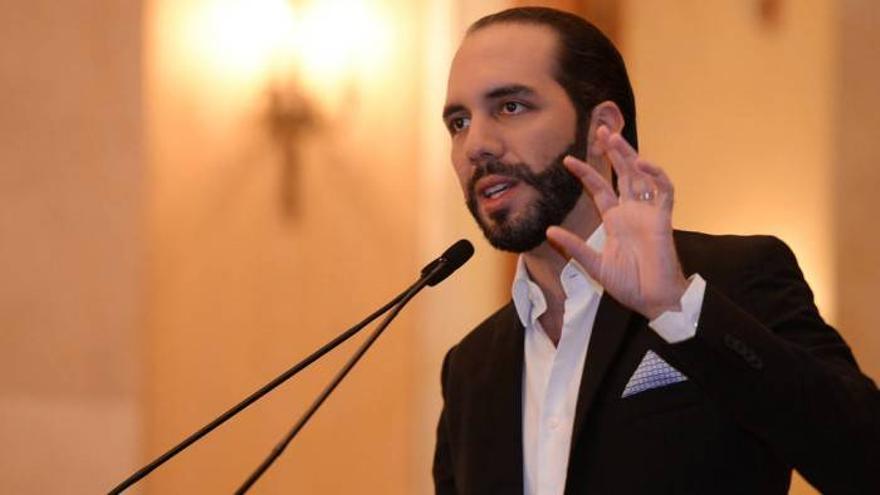
![]() 14ymedio, Carlos Alberto Montaner, Miami, February 10, 2019 — Nayib Bukele swept to victory in the presidential election in El Salvador. Bukele is an outsider who used GANA as an electoral vehicle, a party of the right that split off from ARENA. He used it, despite the fact that its founder, ex-president Tony Saca, is imprisoned and sentenced to ten years in jail, accused of misappropriating $300 million. That circumstance did not matter to anybody. GANA was only a ticket. The party barely got 11 out of a total of 84 representatives.
14ymedio, Carlos Alberto Montaner, Miami, February 10, 2019 — Nayib Bukele swept to victory in the presidential election in El Salvador. Bukele is an outsider who used GANA as an electoral vehicle, a party of the right that split off from ARENA. He used it, despite the fact that its founder, ex-president Tony Saca, is imprisoned and sentenced to ten years in jail, accused of misappropriating $300 million. That circumstance did not matter to anybody. GANA was only a ticket. The party barely got 11 out of a total of 84 representatives.
Bukele liquidated the communists of FMLN (23 representatives) and the liberal-conservatives of ARENA (37). Salvador Sánchez Cerén (FMLN) will leave the presidency with the disapproval of 80% of Salvadorans. He lost some 47% of the votes obtained in the penultimate contest. He is the worst-assessed president since Alfredo Cristiani inaugurated his presidency in 1989, initiating the four ARENA governments. After Saca, the last ARENA president, came Mauricio Funes of FMLN, exiled in Nicaragua accused of stealing $351 million, and, lastly, the repudiated Sánchez Cerén.
Through what crack did the outsider “sneak in?” First, he was no stranger. He had been mayor of San Salvador and voters did not blame him for the poverty or violence, the two main evils afflicting the country. Second, voters are tired of the parties’ empty promises, of corruption, of clandestine “bonuses,” and of traditional communication methods. Bukele barely went to meetings in the capital or in the towns of his tiny country and he avoided debates. He established, to be sure, his distance from Nicolás Maduro and Daniel Ortega, whom he described as “dictators.”
The new president is 37 and has a youthful aspect. If the Spanish poet Rafael Alberti asked for respect because he had been born with the cinema in 1902, Bukele and the young politicians of his generation, in all latitudes, can repeat that call because they were born with the internet, with computers, with Facebook and Twitter. They have another manner of communicating with voters and use it profusely. It is the story as well of Alexis Tsipras in Greece and of Pablo Iglesias in Spain, both Leninists fortunately hobbled by the moderate bourgeois reality of the European Union.
To combat social violence and its countereffect, local desires to emigrate, Bukele would have to create in his people reasonable hopes of prospering. After all, from Panama and Costa Rica, two Central American countries, almost no one leaves. It’s the other way around: they are full of immigrants who share the Panamanian “dream” and the Costa Rican “dream.” They are escaping, instead, from Nicaragua, Honduras, El Salvador, and Guatemala.
How is this miracle achieved? Investing in “human capital,” that is to say, in education and healthcare, but creating sources of work that allow a surplus to be produced over a couple of decades to be able to realize that investment. There are no shortcuts, but the secret is to be a little better each year that passes and forget about charismatic leaders. Freedom, the law, and institutions are irreplaceable. “Poor are the peoples who need heroes,” said Bertold Brecht, although he did not always obey his fair warning.
As for prosperity, all the information available on Bukele makes one think that he trusts in public spending to achieve it. He was a populist mayor, and it is a shame, because that path leads to disaster. He would do very well to dedicate five minutes to a brief YouTube video produced by the Liberty and Progress Foundation of Argentina entitled Productive Work vs. Unproductive Work.
Argentina is one of the few countries on earth that has gone little by little underdeveloping itself and conquering poverty without pause or truce. There he would learn that the growing prosperity is the result of the constant increase in productivity generated by the creativity almost without obstacles of entrepreneurs.
It is not even worthwhile for Bukele to hide behind the size and population of El Salvador to justify a hypothetical failure. They are the same as those of Israel, only that the successful Jewish state is surrounded by enemies, while El Salvador has the advantage of counting on the sympathies and the desire to help of half the planet. Let us hope that common sense enlightens Bukele. If he is not successful it will be terrible.
Translated by: Sheilagh Carey
__________________________________
The 14ymedio team is committed to serious journalism that reflects the reality of deep Cuba. Thank you for joining us on this long road. We invite you to continue supporting us, but this time by becoming a member of 14ymedio. Together we can continue to transform journalism in Cuba.
